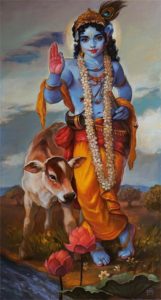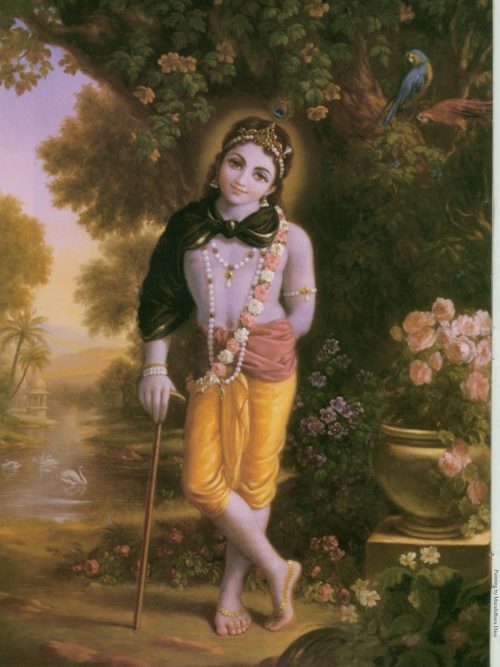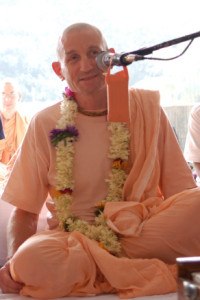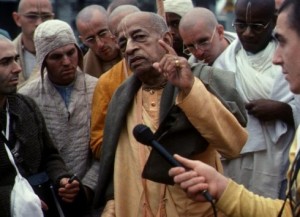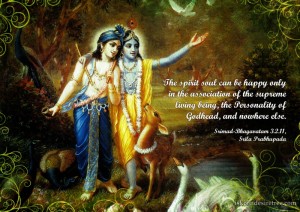7th April, 2017. Gurgaon.
Hare Krishna dear devotees,
I could not post the blog for a long time as life turned a bit busy, please forgive me for this laxity.
Yesterday morning I read the very beautiful, and famous, verse from Srimad Bhagavatam and now sharing the same with you.
This particular chapter, SB 10.14, describes the Brahmā ji’s prayers to Lord Kṛṣṇa. Brahmā ji first praised the beauty of the Lord’s transcendental limbs and then declared that Krishna’s original identity of sweetness is even more difficult to comprehend than His opulence. And only by the devotional process of hearing and chanting transcendental sounds received from Vedic authorities can one realize the Personality of Godhead. It is fruitless to try to realize God through processes outside the scope of Vedic authority.
Brahmā ji is praying to Lord Krishna:
My dear Lord, devotional service unto You is the best path for self-realization. If someone gives up that path and engages in the cultivation of speculative knowledge, he will simply undergo a troublesome process and will not achieve his desired result. As a person who beats an empty husk of wheat cannot get grain, one who simply speculates cannot achieve self-realization. His only gain is trouble.
O almighty Lord, in the past many yogīs in this world achieved the platform of devotional service by offering all their endeavors unto You and faithfully carrying out their prescribed duties. Through such devotional service, perfected by the processes of hearing and chanting about You, they came to understand You, O infallible one, and could easily surrender to You and achieve Your supreme abode.
Then comes the gem of a verse wherein Brahmā ji reveals that to go back to Godhead a devotee simply has to patiently tolerate his past karmic reactions in this lifetime, while sincerely & seriously practicing Krishna consciousness! This may sound too good to be true or too easy but these are the words from Srimad Bhagavatam, Amala Purana, spoken by Brahmā ji, who also happens to be the head of our sampradaya. Srila Vishvanatha Chakravarti Thakura said that this verse describes Bhakti.
tat te ’nukampāṁ su-samīkṣamāṇo
bhuñjāna evātma-kṛtaṁ vipākam
hṛd-vāg-vapurbhir vidadhan namas te
jīveta yo mukti-pade sa dāya-bhāk
My dear Lord, one who earnestly waits for You to bestow Your causeless mercy upon him, all the while patiently suffering the reactions of his past misdeeds and offering You respectful obeisances with his heart, words and body, is surely eligible for liberation, for it has become his rightful claim.
(SB 10.14.8)
Śrīla Śrīdhara Svāmī explains in his commentary that just as a legitimate son has to simply remain alive to gain an inheritance from his father, one who simply remains alive in Kṛṣṇa consciousness, following the regulative principles of bhakti-yoga, automatically becomes eligible to receive the mercy of the Personality of Godhead. In other words, he will be promoted to the kingdom of God.
The word su-samīkṣamāṇa indicates that a devotee earnestly awaits the mercy of the Supreme Lord even while suffering the painful effects of previous sinful activities. Lord Kṛṣṇa explains in the Bhagavad-gītā that a devotee who fully surrenders unto Him is no longer liable to suffer the reactions of his previous karma. However, because in his mind a devotee may still maintain the remnants of his previous sinful mentality, the Lord removes the last vestiges of the enjoying spirit by giving His devotee punishments that may sometimes resemble sinful reactions. The purpose of the entire creation of God is to rectify the living entity’s tendency to enjoy without the Lord, and therefore the particular punishment given for a sinful activity is specifically designed to curtail the mentality that produced the activity. Although a devotee has surrendered to the Lord’s devotional service, until he is completely perfect in Kṛṣṇa consciousness he may maintain a slight inclination to enjoy the false happiness of this world. The Lord therefore creates a particular situation to eradicate this remaining enjoying spirit. This unhappiness suffered by a sincere devotee is not technically a karmic reaction; it is rather the Lord’s special mercy for inducing His devotee to completely let go of the material world and return home, back to Godhead.
A sincere devotee earnestly desires to go back to the Lord’s abode. Therefore he willingly accepts the Lord’s merciful punishment and continues offering respects and obeisances to the Lord with his heart, words and body. Such a bona fide servant of the Lord, considering all hardship a small price to pay for gaining the personal association of the Lord, certainly becomes a legitimate son of God, as indicated here by the words dāya-bhāk. Just as one cannot approach the sun without becoming fire, one cannot approach the supreme pure, Lord Kṛṣṇa, without undergoing a rigid purificatory process, which may appear like suffering but which is in fact a curative treatment administered by the personal hand of the Lord.
So we can appreciate how unique is our journey in Krishna Consciousness. How even the aspiring devotees remain under the direct shelter of the lotus feet of Krishna. We just need to remain sincere & serious, practice tolerance and be simple hearted. Then there is no faster route back to Godhead.
Now it is up to us to decide if sincerity, simplicity and tolerance are too high a price to pay for gaining the personal association of Lord?
All glories to Sri Guru and Gauranga
All glories to Srila Prabhupada
Your servant,
Giriraj dasa

